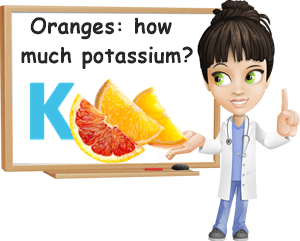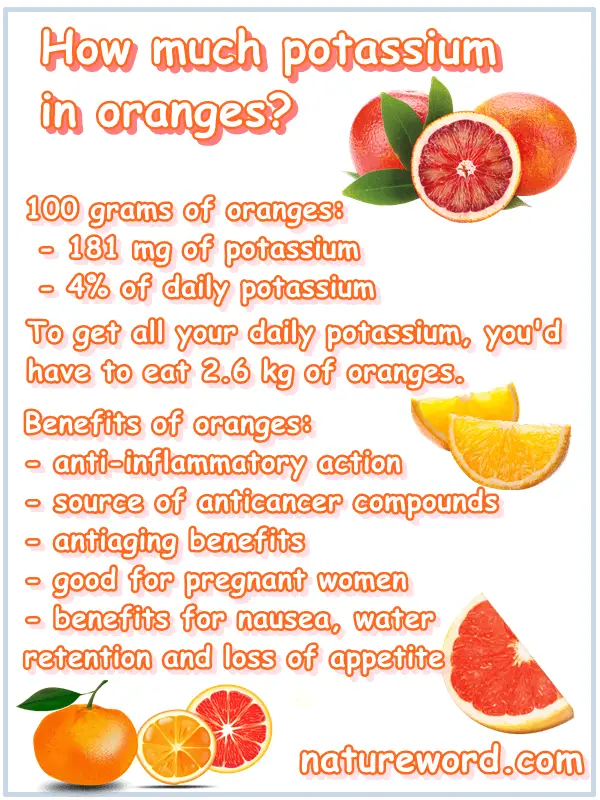What is the potassium content of oranges? How much potassium is there in just one orange? How much potassium in navel oranges? What about Cara Cara oranges? And blood oranges? How much potassium per 100 grams of orange? Are oranges foods rich in potassium? How many oranges do you have to eat to get your daily potassium? Is it good to get your potassium from oranges vs other foods? Can you even eat oranges everyday?

How much potassium in oranges?
- There are 181 mg (milligrams) of potassium in 100 grams of orange (estimated potassium content for raw oranges from all commercial varieties).
- There are 326 mg of potassium per one cup of orange segments at an estimated weight of 180 grams per cup.
- There are 179 mg of potassium per 100 grams of raw California Valencia oranges.
- There are 169 mg of potassium per 100 grams of raw Florida oranges.
- There are 166 mg of potassium per 100 grams of raw navel oranges.
- There are 166 mg of potassium per 100 grams of raw Cara Cara oranges.
- There are 169 mg of potassium per 100 grams of raw blood oranges.
- There are 166 mg of potassium per 100 grams of clementine oranges.
- There are 166 mg of potassium per 100 grams of raw tangerines, a variety of mandarin orange and one of the many different types of oranges.
- There are 196 mg of potassium per 100 grams of raw oranges with peel.
- There are 212 mg of potassium per 100 grams of raw orange peel.
How much potassium in an orange?
- There are 174 mg of potassium in one small orange at an estimated weight of 96 grams.
- There are 333 mg of potassium in one large orange at an estimated weight of 184 grams.
- There are 588 mg of potassium in one extra large orange with peel at an estimated weight of 300 grams.
- There are 217 mg of potassium in one California Valencia orange at an estimated weight of 121 grams a fruit.
- There are 238 mg of potassium in one Florida orange at an estimated weight of 141 grams per fruit. There are 255 mg of potassium in one Florida orange at an estimated weight of 151 grams a fruit.
- There are 232 mg of potassium in one navel orange at an estimated weight of 140 grams a fruit.
- There are 232 mg of potassium in one Cara Cara orange at an estimated weight of 140 grams a fruit.
- There are 260 mg of potassium in one blood orange at an estimated weight of 154 grams a fruit.
- There are 141 mg of potassium per one clementine orange at an estimated weight of 85 grams a fruit.
- There are 126 mg of potassium per one small tangerine orange at an estimated weight of 76 grams a fruit.
- Discover more: Is Tangerine High In Potassium?
- There are 199 mg of potassium per one large tangerine orange at an estimated weight of 120 grams a fruit.

Are oranges high in potassium?
Oranges definitely do not make the potassium rich foods list. Most culinary fruits are naturally quite low in potassium with an average potassium content of approximately 5% per 100 grams of fruit. Oranges too fall in this category, and so do apples, berries, cherries and more.
How high in potassium are oranges?
- 100 grams of orange provides 3.85% of daily potassium values for the average adult (estimated potassium content for raw oranges from all commercial varieties).
- 1 cup of orange segments (180 grams a cup) provides 6.9% of daily potassium values for an adult.
- 100 grams of raw orange with peel provides 4.1% of daily potassium.
- 100 grams of raw orange peel provides 4.5% of daily potassium.
- 1 small orange (estimated weight: 96 grams) provides 3.7% of daily potassium.
- 1 large orange (estimated weight: 184 grams) provides 7.15% of daily potassium.
- 1 extra large orange with peel (estimated weight: 300 grams) provides 12.5% of daily potassium.
- 1 California Valencia orange (estimated weight: 121 grams) provides 4.6% of daily potassium.
- 1 Florida orange (estimated weight: 141 grams) provides 5% of daily potassium.
- 1 navel orange (estimated weight: 140 grams) provides 4.9% of daily potassium.
- 1 Cara Cara orange (estimated weight: 140 grams) provides 4.9% of daily potassium.
- 1 blood orange (estimated weight: 154 grams) provides 5.55% of daily potassium.
- 1 clementine orange (estimated weight: 85 grams) provides 3% of daily potassium.
- 1 small tangerine orange (estimated weight: 76 grams) provides 2.7% of daily potassium.
- 1 large tangerine orange (estimated weight: 120 grams) provides 4.2% of daily potassium.
Oranges potassium content vs other foods
- Orange potassium content: close to 4% of daily values for the mineral per 100 grams of fruit.
- Orange juice potassium content: a little over 4% of daily values for the mineral per 100 ml of juice.
- Cashews potassium content: 14% of daily values.
- Banana potassium content: less than 8% of daily values per 100 grams of fruit.
- Fresh apricots potassium content: 5.5% of daily values.
- Dried apricots potassium content: 25% of daily values.
- Avocado potassium content: a little over 10% of daily values.
- Apples potassium content: a little over 2% of daily values.
- Broccoli potassium content: close to 7% of daily values.
- Spinach potassium content: close to 12% of daily values.
- Broad beans (fava beans) potassium content: close to 23% of daily values.
- Is Lemon High In Potassium?
How many oranges do you have to eat to get your daily potassium?
The average adult needs about 4700 milligrams or 4.7 grams of potassium everyday. How many oranges is that exactly? It depends on the type of orange, cultivar, and also individual fruit size. But on average you would have to eat about 2.6 kilograms of oranges to get all of your daily potassium. This is an excessive amount of the fruit and can represent a source of side effects and adverse reactions.
Can you eat oranges everyday?
While you can eat oranges everyday, whether for their potassium content or other nutritional benefits, it’s best to include a range of fruits, vegetables and other foods in your diet. You can definitely eat oranges too for their potassium content, but do not rely solely on them.
Healthy high potassium foods to choose from include broad beans (fava beans), nuts and seeds such as chestnuts, cashews, Brazil nuts, sunflower seeds or pumpkin seeds, vegetables such as spinach, kale, chard, Brussels sprouts, butternut squash, fresh and dried apricots and raw fruit such as kiwifruit, bananas and avocado.
See also :
What are the benefits of eating oranges?
The small amounts of potassium in oranges contribute to better bone density, lower blood pressure numbers and help combat water retention, swelling and puffiness. Oranges have antiaging benefits thanks to vitamin C which stimulates the production of collagen for better skin elasticity. Vitamin C further exerts anti-inflammatory benefits, lowering levels of inflammation markers in the body such as C-reactive protein.
Oranges are a good source of vitamin B1 and vitamin B9 with benefits for the nervous system. In pregnant women, vitamins B1 and B9 are needed for the normal development of the brain and nervous system of the baby, and help prevent birth defects. Eating oranges during pregnancy can also help combat nausea, rehydrate and replenish part of the electrolyte loss after vomiting, as well as stimulate appetite.
Orange pulp, pith (albedo) and peel, and orange juice all contain anticancer flavonoid antioxidants such as hesperidin. Orange peel itself contains limited amounts of potassium, and you can use it to make a flavorful orange tea.
However, citric acid in oranges can sensitize teeth and irritate the gastric mucosa, causing gastritis flareups and acid reflux. If you have digestive issues such as acid reflux disease or gastritis, either choose acidless oranges, or another food altogether to get your daily potassium or other nutrients.
